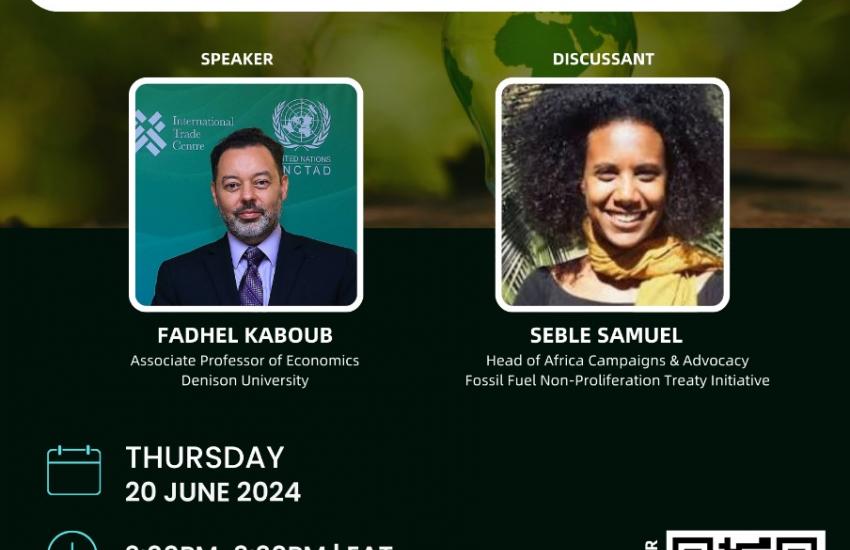IDS Seminar on “Just Green Transition in Africa”
The Institute for Development Studies on Thursday, 20th June 2024 held its weekly seminar series, themed “Just Green Transition in Africa.” from 2pm-3.30pm EAT.
The presenter was Fadhel Kaboub, Associate Professor of Economics at Denison University, and the discussant was Seble Samuel, Head of Africa Campaigns and Advocacy at the Fossil Fuel Non-Proliferation Treaty Initiative. The session was moderated by Dr. Radha Upadhyaya, from IDS.
The presentation highlighted the need for Africa to have a long-term strategic vision, and that Africa can't continue to be:
The source of cheap raw materials
Dumping ground for Global North industrial output and
Dumping ground for obsolete assembly-line manufacturing
Another important message shared was that:
We can't decarbonize, democratize, and de-dollarize a system that hasn’t been decolonized yet.
The presenter noted that Africa faces structural economic deficiencies marked by high external debt and other major root causes such as low value-added industrialization and trade deficits. The result of these challenges is net neocolonial extraction of over $2 trillion from the Global South to the Global North every year.
The suggested structural solutions include:
Pan-African Cooperation for strategic investments in food sovereignty and agro ecology, renewable energy sovereignty, and high value-added industrial policies.
Structural transformation of the global financial architecture and international trade, investment, and taxation system.
The presentation labeled carbon markets, solar radiation geo-engineering as “dangerous false solutions”
The Discussant focused on the need for countries and industries to move away from fossil fuels, which will contribute to a just green transition. There is a proposed Fossil Fuel Treaty and it encompasses a just transition, non-proliferation, and a fair phase-out.
Some of the questions from the participants were:
Wangui: there is a cadre of African researchers who say that Africa should use fossil fuels for (capitalistic) ‘development’ while the West stops. What do you think of these perspectives?
How can we mobilize against the “green growth” perspective mobilized by the Kenyan president?
Najib: How do you see countries with a feminist foreign policy playing a role in the just transition that is transboundary and especially addressing neocolonialism?
Grace: There have been small-scale projects for electric energy generated from plastic waste. Is this also strengthening the fossil fuel impact on climate seeing that if it is embraced large scale it can help reduce the volume of landfills.
Jacqueline: Africa’s major poverty is energy poverty. Is this correct considering that Kenya is in fossil fuels?
Michuki: What does just transition mean in a context where the informal sector plays a key role in the livelihoods of the people, and this informality also acts as a structural challenge in such economies?


